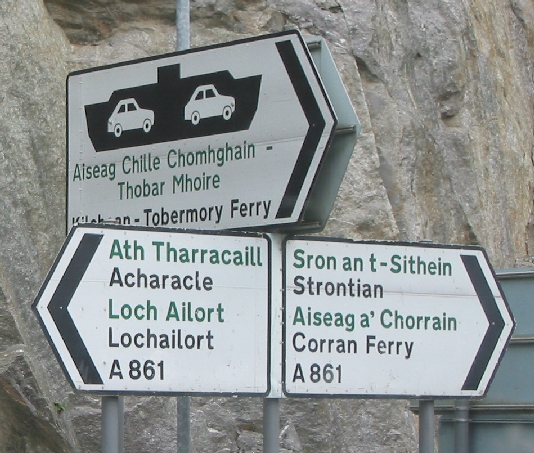|
ERSE (erss)
Any
of several related languages of the Celts in Ireland and Scotland
Common
clues: Highland
dialect; Gaelic; Irish language; Skye writing; Scottish Gaelic;
Celtic language; Hebrides tongue; Language that gives us
“whiskey”
Crossword
puzzle frequency:
9 times a year
News:
Teaching
Gaelic 'needs written guidance' HMIE say
Video:
A
Gaelic Blessing
Chan
fhiach cuirm gun a còmhradh.
A
feast is no use without good talk.
~
Gaelic Proverb
The
Goidelic languages (also sometimes called the Gaelic languages or
collectively Gaelic) are one of two major divisions of modern-day
Insular Celtic languages (the other being the Brythonic
languages). There are three attested Goidelic languages: Irish
(Gaeilge), Scottish Gaelic (Gàidhlig), and Manx (Gaelg).
Shelta is sometimes mistakenly thought to be a Goidelic language
when it is, in fact, a cant based on Irish and English, with a
primarily English-based syntax.

Place
names in their original Gaelic are becoming increasingly common
on road signs throughout the Scottish Highlands.
Although
Irish and Manx are often referred to as Irish Gaelic and Manx
Gaelic (and they are Goidelic or Gaelic languages) the use of the
word Gaelic is unnecessary because the words Irish and Manx only
ever refer to these languages whereas Scots by itself refers to a
Germanic language and Scottish can refer to things not at all
Gaelic. The word Gaelic by itself is somewhat ambiguous, but most
often refers to Scottish Gaelic and it is the word that Scottish
Gaelic speakers themselves use when speaking English.
Furthermore,
due to the peculiar politics of language and national identity,
some Irish speakers are offended by the use of the word Gaelic by
itself to refer to Irish.
Similarly,
some Scottish Gaelic speakers also find offensive the use of the
obsolete word Erse (from Erisch, "Irish") to refer to
their language. This term was used in Scotland since at least the
late 15th century to refer to Gaelic, which had previously been
called Scottis.
The
names used in languages themselves (Gaeilge in Irish, Gaelg in
Manx, and Gàidhlig in Scottish Gaelic) are derived from
Old Irish Goídeleg, which in itself is from the originally
more-or-less derogative term Goídel meaning "pirate,
raider" in Old Welsh. The Goidels called themselves various
names according to their tribal/clan affiliations, but the most
general seems to have been the name rendered in Latin as Scoti.
This
article is licensed under the GNU
Free Documentation License.
It uses material from the Wikipedia
article "Goidelic Languages".
ERSE
(496) 124
Tu+ >1 08 Gaelic
59
We- >1 09 Gaelic tongue
25
>1 03 Scottish Gaelic
24
Tu >1 04 Highland tongue
21
Th- >1 09 Highlands tongue
21
We >1 02 Scots Gaelic
14
Th- >1 08 Celtic language MANX
14
Tu+ >1 09 Gaelic language MANX
12
>1 95 Highland Gaelic
10
We+ >1 09 Celtic dialect
9
Th >1 06 Celtic tongue
9
Tu+ >1 02 Irish Gaelic
8
Th+ >1 03 European tongue
8
We >1 07 Irish tongue
7
Th+ >1 03 Hebrides tongue
7
We+ >1 07 Limerick language
7
>1 08 Old Gaelic
6
Th NYT 87 Old tongue
5
We- >1 98 Gael's tongue
5
Sa- >1 08 Manx relative
5
Th- >1 08 Old World language
4
Th- >1 99 Gael's language
3
Th- NYT 03 European language
3
Th- >1 00 Hebrides language
3
Tu >1 03 Highland language
3
We+ >1 07 Highlands language
5
Tu- >1 95 Summer on the Somme
|